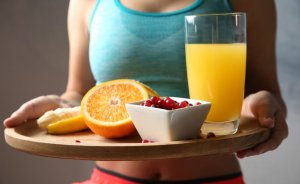Breakfast Ideas For Athletes

All nutritionists agree that the first meal of the day is the most important. But, if we practice sports, we need to watch and control what constitutes our morning meals. An athlete’s breakfast is a little different from an average person’s.
A powerful American breakfast
It seems incredible, but this breakfast menu, deeply rooted in the United States, is highly recommended for athletes. That is toast, eggs and a piece of ham to obtain proteins.

Of course, this will not be enough. Therefore, we should always supplement our meals with natural orange juice, preferably. Along with a banana, so that we have enough of the potassium that’s so essential for maintaining physical activity.
Alongside the above, some light yogurt will never hurt. In the fitness world, this breakfast is highly favored provided it’s accompanied by smoothies before and after breakfast.
Morning meals for soccer players
For those who practice this sport, perhaps a lighter breakfast is preferable to help endure the training sessions. In this case, we must have a good source of cereals and bread. This is the most fundamental and important nutrient.
Milk and coffee are an important source of proteins and activate the muscles. This type of athlete should try to eat a decent amount of fruit for breakfast, which they’ll use to synthesize vitamins and minerals.
Of course, we must accompany all of this with plenty of water and energy drinks during and after training. Lunch and the rest of the meals will even out our energetic requirements.
Breakfasts for aquatic athletes
Eating a decent amount of carbohydrates for breakfast before doing water sports is crucial. However, this obligates the athlete to wait at least two hours before training.
Cereals and suitable quantities of bread and nuts will define the swimmer’s morning breakfast routine. Complete this breakfast with honey, marmalade, and dairy products to help cope with one of the most demanding sports out there. Also, eat plenty of bananas since they’re a great source of potassium.
But, if the training session is early in the morning, the right thing to do is make a provisional and energy-rich meal based on liquids. Fruit juices, skim milk and an energy bar should be enough for you to endure training. It won’t be necessary to drink electrolyte-based sports drinks while training.

An energy-boosting breakfast for athletes
But, if what we want a lot of energy for the gym, we must add some additional supplements. So, along with the toast, eggs, cereals, and milk, spread a little butter on the bread, for example.
Jam, olive oil, and tomatoes will give us slightly more energy. And in addition to the orange juice, it would be advisable to eat about ten raisins and five nuts.
Doing this will give us enough energy to handle the weights and machines until our next shake or snack. The dynamics up to this point should be quite clear: protein breakfasts -controlling the intake of proteins- with plenty of vitamins, just make sure it’s not too heavy. In other words, a well-balanced meal.
Breakfasts for athletes
The ideal proportions for an athlete’s breakfast have already been established. Broadly speaking, a morning meal should contain between 55 to 70 percent carbohydrates, 20 or 25 percent fats and 10 to 20 percent proteins. Of course, the proportion varies depending on the type of sport.
Regardless, the important thing is that the uptake of nutrients is sufficient and well-balanced. What we want from this regimen is to absorb energy without compromising the digestive system.
Generally, an athlete’s breakfast won’t contain more than 729 calories per daily serving. Carbohydrates and fats provide proper nutrition, but they break down during exercise. This is how you maintain good physical condition and achieve the muscle tone you desire.
Beyond that, it’s advisable to consult a personal trainer and a nutritionist to know what exactly your body needs. After all, each body is different and requires different treatment.
All nutritionists agree that the first meal of the day is the most important. But, if we practice sports, we need to watch and control what constitutes our morning meals. An athlete’s breakfast is a little different from an average person’s.
A powerful American breakfast
It seems incredible, but this breakfast menu, deeply rooted in the United States, is highly recommended for athletes. That is toast, eggs and a piece of ham to obtain proteins.

Of course, this will not be enough. Therefore, we should always supplement our meals with natural orange juice, preferably. Along with a banana, so that we have enough of the potassium that’s so essential for maintaining physical activity.
Alongside the above, some light yogurt will never hurt. In the fitness world, this breakfast is highly favored provided it’s accompanied by smoothies before and after breakfast.
Morning meals for soccer players
For those who practice this sport, perhaps a lighter breakfast is preferable to help endure the training sessions. In this case, we must have a good source of cereals and bread. This is the most fundamental and important nutrient.
Milk and coffee are an important source of proteins and activate the muscles. This type of athlete should try to eat a decent amount of fruit for breakfast, which they’ll use to synthesize vitamins and minerals.
Of course, we must accompany all of this with plenty of water and energy drinks during and after training. Lunch and the rest of the meals will even out our energetic requirements.
Breakfasts for aquatic athletes
Eating a decent amount of carbohydrates for breakfast before doing water sports is crucial. However, this obligates the athlete to wait at least two hours before training.
Cereals and suitable quantities of bread and nuts will define the swimmer’s morning breakfast routine. Complete this breakfast with honey, marmalade, and dairy products to help cope with one of the most demanding sports out there. Also, eat plenty of bananas since they’re a great source of potassium.
But, if the training session is early in the morning, the right thing to do is make a provisional and energy-rich meal based on liquids. Fruit juices, skim milk and an energy bar should be enough for you to endure training. It won’t be necessary to drink electrolyte-based sports drinks while training.

An energy-boosting breakfast for athletes
But, if what we want a lot of energy for the gym, we must add some additional supplements. So, along with the toast, eggs, cereals, and milk, spread a little butter on the bread, for example.
Jam, olive oil, and tomatoes will give us slightly more energy. And in addition to the orange juice, it would be advisable to eat about ten raisins and five nuts.
Doing this will give us enough energy to handle the weights and machines until our next shake or snack. The dynamics up to this point should be quite clear: protein breakfasts -controlling the intake of proteins- with plenty of vitamins, just make sure it’s not too heavy. In other words, a well-balanced meal.
Breakfasts for athletes
The ideal proportions for an athlete’s breakfast have already been established. Broadly speaking, a morning meal should contain between 55 to 70 percent carbohydrates, 20 or 25 percent fats and 10 to 20 percent proteins. Of course, the proportion varies depending on the type of sport.
Regardless, the important thing is that the uptake of nutrients is sufficient and well-balanced. What we want from this regimen is to absorb energy without compromising the digestive system.
Generally, an athlete’s breakfast won’t contain more than 729 calories per daily serving. Carbohydrates and fats provide proper nutrition, but they break down during exercise. This is how you maintain good physical condition and achieve the muscle tone you desire.
Beyond that, it’s advisable to consult a personal trainer and a nutritionist to know what exactly your body needs. After all, each body is different and requires different treatment.
This text is provided for informational purposes only and does not replace consultation with a professional. If in doubt, consult your specialist.








